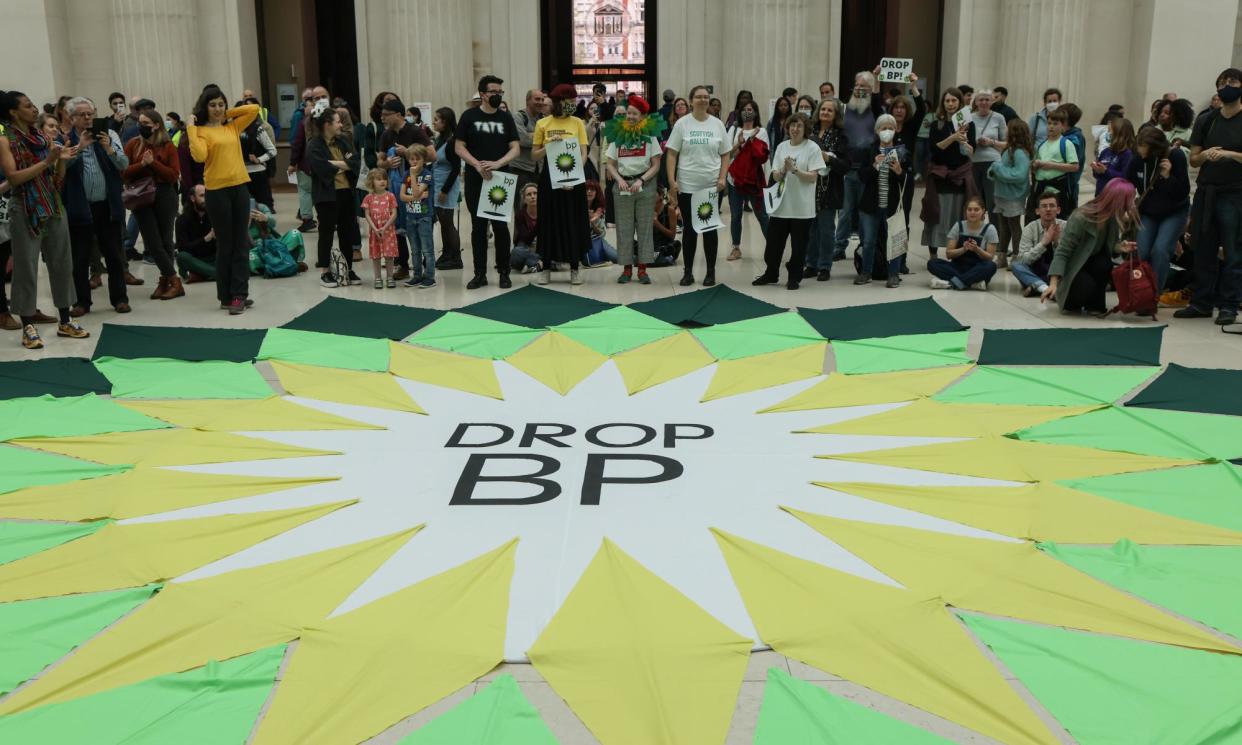British Museum’s BP sponsorship deal ‘astonishingly out of touch’

Campaigners have called the British Museum “astonishingly out of touch” after it announced a 10-year, £50m partnership with BP to help fund one of the biggest redevelopments in its history.
The museum announced on Tuesday that the energy company would be helping to fund its ambitious “masterplan” project, a redevelopment estimated to cost £1bn.
There will be wholesale modernisation of its grand but ailing building in Bloomsbury, central London, culminating in a redisplay of the entire collection.
The museum said the “scale, complexity and importance” of the masterplan, which has been years in the planning, “means it will be one of the most significant cultural redevelopment projects ever undertaken”.
The museum said BP’s money was the biggest ever single donation to the UK’s cultural sector. It will go towards the architectural renovation of galleries on the western side of the museum that house collections including artefacts from ancient Egypt, Greece and Rome.
The donation has been condemned by campaigners who accuse the energy company of trying to greenwash its reputation.
Chris Garrard, a co-director of the campaign group Culture Unstained, said the deal was “astonishingly out of touch”, “completely indefensible” and would be formally challenged by campaigners.
“The only way you can sign up to a new sponsorship deal with a planet-wrecking fossil fuel company in 2023 is by burying your head in the sand, pretending the climate crisis isn’t happening and ignoring the almost complete rejection of fossil fuel funding by the cultural sector in recent years,” he said.
The museum has for years been the scene of noisy and disruptive protests and that seems set to continue.
The activist theatre group BP or Not BP? said on X: “You can’t partner with a major polluter in 2023 and say you’re sustainable – this is #climate denial!! This deal will NOT stand – it will be stopped.”
Doug Parr, the UK policy director for Greenpeace, said: “The arts and culture world has been steadily cutting ties with big oil after realising the handy role they play in cleaning up their climate-wrecking image. Yet BP have wormed their way back into the British Museum with what must surely be one of the biggest, most brazen greenwashing sponsorship deals the sector has ever seen.
“No cultural establishment that has a responsibility to educate and inform should be allowing fossil fuel companies to pay them to clean their image, not least the British Museum who have been here before. Did they learn nothing?”
BP has in recent years been dropped as a sponsor by arts organisations including the National Portrait Gallery, Tate and the Royal Opera House.
The British Museum was one of the last to continue having a relationship with BP but it had been thought that the sponsorship had finally come to an end this year, after 27 years. But any thought of that was evidently wrong.
A spokesperson said the museum was in urgent need of renovation and “to be able to achieve this massive modernisation we have to consider corporate and private donations”.
They said: “We need significant financial support to be able to move forward and make sure this museum is still here for generations to come. We are delighted to have this support from BP.”
The trustees of the museum, which is chaired by the former Conservative chancellor George Osborne, agreed the BP sponsorship in late June.
Minutes of the meeting reveal it was a unanimous decision, although “some trustees repeated their personal disagreements with accepting funding from such sponsors”. It has also emerged that the broadcaster Muriel Gray submitted her resignation as a trustee in November in what she said, according to the minutes, was “a personal decision”.
The announcement caps a turbulent spell for the museum, with its international reputation damaged by the revelation that up to 1,500 artefacts had been stolen over a number of years.
It became clear that the museum had brushed off warnings about the thefts, and the scandal led to the resignation of the museum’s director, Hartwig Fischer. Last week it emerged that Fischer’s deputy, Jonathan Williams, had also left.
The museum continues to be in the glare of multiple restitution claims, not least over the Parthenon marbles, which last month blew up into an international diplomatic row when Rishi Sunak cancelled a meeting with his Greek counterpart, Kyriakos Mitsotakis, after he called for the sculptures to be returned ahead of their planned talks.
The BP sponsorship was announced alongside plans the museum has for a new energy centre that will “see the phasing out of the use of fossil fuels within the museum’s estate”.
The museum also said it would remain open throughout the redevelopment. That is in contrast to the Rijksmuseum in Amsterdam, which closed for 10 years for its €375m overhaul; and the National Portrait Gallery, which reopened last summer after three years.
Louise Kingham, the chair of BP, said the company was proud of its partnership with the museum. “The British Museum offers a window to the world for the millions of people that pass through its doors every year. As a business that has made Britain its home for over a century, we are proud to be a long-term partner to this important British institution and play our part in its future transformation,” she said.
Charlie Mayfield, the chair of the museum’s masterplan committee, said: “The British Museum is one of the largest and most visited cultural institutions in the world but some of its buildings are over 200 years old and in urgent need of refurbishment. That’s why the masterplan is so essential – and it’s exciting to be moving forward with our plans.”


